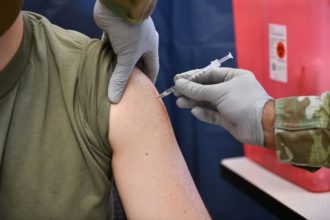The Missouri Supreme Court building in Jefferson City (Annelise Hanshaw/Missouri Independent).
Attorneys representing transgender minors, their loved ones and physicians who provide gender-affirming care say a circuit court judge’s decision to uphold the state’s gender-affirming-care restrictions was “permeated by legal and factual errors.”
In oral arguments in the Missouri Supreme Court Wednesday morning, Lambda Legal attorney Nora Huppert said the November judgment “relies on evidence that was expressly excluded for its truth, and it draws conclusions from testimony that are the opposite of what that testimony says.”
For that reason, and others, Huppert argues the decision should be reversed.
But the Missouri Attorney General’s office, represented Wednesday by Solicitor General Lou Capozzi, rejects the notion that the law is discriminatory in nature.
“Appellants have no evidence for their allegation that this could be only motivated by animus when the state presented a mountain of evidence that it is concerned about the health and safety of children,” he told the judges.
The law, passed in 2023, bars health care providers from prescribing or administering cross-sex hormones or puberty-blocking drugs, or performing gender-transition surgeries, for anyone under 18. Provisions barring gender-affirming hormones and puberty blockers are set to expire on Aug. 28, 2027, though lawmakers have shown intentions to remove the sunset.
In his November ruling, Wright County Circuit Court Judge Craig Carter determined that the restrictions weren’t discriminatory and could only be subject to rational basis review. This is the most lenient standard, requiring challengers to prove that there is no basis that the law can stand.
The legal standard for reviewing the law is a key part of the case. Statutes that violate Missouri’s equal protection clause, which says everyone is entitled to “equal rights and opportunity,” are subject to heightened scrutiny.
Attorneys from Lambda Legal, a civil rights law firm focused on LGBTQ+ litigation, and the ACLU of Missouri argue heightened scrutiny should be applied because the law “classifies based on sex and transgender status.”
Evidence — and the quality of it — is also a point of contention.
Huppert said Carter’s judgment “adopted largely verbatim” the state’s proposed findings of fact, which was filed at the conclusion of trial and before the court’s transcript was complete. The filings confirm Carter’s findings of fact outright mirror the state’s, adopting the same subheadings and copying paragraphs verbatim.
This makes the judgment deeply flawed, appellants’ brief argues, because these findings misconstrued testimony from the trial and refer to exhibits that were not allowed into the court record.
During the two-week trial last year, the attorney general’s office employed a tactic of questioning witnesses using articles and studies not accepted into the court record.
Capozzi pointed to a section of the judgment which expanded on testimony from medical ethicist Dr. Farr Curlin as proof the two documents were not 100% identical.
“The trial court was not just copying and pasting,” he said. “And the implication that the trial court was lazy or didn’t do its job is not proper.”
Judge Craig Carter, a Wright County judge serving in Cole County for Missouri’s gender-affirming care trial, listens to a nurse practitioner testify during the September 2024 trial (Annelise Hanshaw/Missouri Independent).
Carter’s judgment acknowledges the overwhelming amount of evidence presented during the extensive trial, describing “binders of evidentiary documents that were piled so high on the bench that (his) was at times obscured.”
“This was a very lengthy and complex case,” he wrote. “It would be impossible for the court to make factual findings for each witness. The court reporter’s transcript in this case is several thousand pages.”
A clear look at the evidence, Huppert argued, would show the law is unconstitutional no matter what level of scrutiny is applied.
“The record reflects that the care ban for minors actually harms minors rather than protects them, and for that reason, the law is wholly irrational as well,” she told the judges.
Interpreting the evidence in this case is not straightforward. From the beginning, the law’s challengers and the state have not agreed on the factual background of the case and those disagreements continued Wednesday.
For example, Capozzi opened his argument by describing the law as “bipartisan,” misconstruing a compromise that led Senate Democrats to end a filibuster. But no Democrats in either the House or Senate voted in favor of the legislation.
The state’s argument also rejects claims that gender-affirming hormone therapy and puberty blockers treat gender dysphoria, a condition describing distress that occurs when someone’s sex as assigned at birth misaligns with their gender identity.
In the trial, experts largely spoke about the effectiveness of treatments as it relates to adolescents. But part of the challenged law bans the state’s Medicaid program from covering gender-affirming care for minors and adults.
Carter upheld the Medicaid restrictions, saying challengers “failed to develop any argument specifically tailored to challenging the Medicaid provision.”
Huppert said that argument was “throughout” filings. Appellants included Medicaid ban as part of “the act” in filings, challengers’ brief said, but the state claims the argument wasn’t explicit.
Judges had almost no questions during the arguments Wednesday, apart from a question from Judge Ginger Gooch asking how the case differs from a challenge of Arkansas’ gender-affirming-care ban. A federal appeals court upheld Arkansas’ ban in August.
The states’ statutes have some differences, Huppert said, and Missouri’s equal protection clause is more extensive than the federal protections relied upon in that case.
Capozzi said the statutes are “almost identical,” also pointing to similarities in Tennessee’s gender-affirming-care restrictions which the U.S. Supreme Court upheld in June.
SUBSCRIBE: GET THE MORNING HEADLINES DELIVERED TO YOUR INBOX









